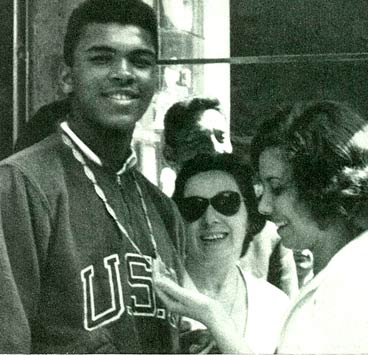At age 19, Muhammad Ali was a shining example of the American athletic hero. He was a confident, aggressive, and powerful boxer. But he could occasionally show the shyness and modesty Americans like in their celebrities, as Post writer Dick Schaap observed in 1961.
Cassius Marcellus Clay Jr., who at eighteen won the 1960 Olympic light-heavyweight boxing championship, has not the slightest doubt that he is the future heavyweight champion of the world.
Clay has had only five fights since turning pro last fall, but it is inconceivable to him that he could fail to go all the way.
Sprinkling bold and candid words that must be taken with grains of salt, Clay cultivates fame and popularity the way some fighters cultivate a knockout punch. “Man,” he says, “I love to see my name in print. I love to see my name where everybody can see it.”
Yet, Ali was more than a brash young contender. He charmed Schaap with his friendliness and his surprise at his newfound fame.
When a sports writer pointed out that he seemed more sociable than
the usual fighter, Clay agreed. “I don’t pretend to be friendly,” he said, “like most people do when they’re trying to get on top. I am friendly.”
“Back home,” he said, “they’ll think it’s real. They won’t know the difference.”
As Clay strolled through Times Square, a passer-by did a double take and asked, “Aren’t you Cassius Clay?”
“How’d you know who I was?”
The stranger slapped Clay on the back. “I saw you on TV,” he said, “So did lots of people. They all know who you are.”
Clay hung his head, feigning modesty. “Really?” he said. “You really know who I am? That’s wonderful.'” Dozens of people stopped him on the street, and for each Clay had a grin and a fresh air of amazement. “I guess everybody do know who I am,” he conceded.
He entered a penny arcade and had a newspaper headline printed: CASSIUS SIGNS FOR PATTERSON FIGHT.
That headline became a reality just four years later, when Ali beat Patterson with a T.K.O. in the 12th round.
In trying to understand what motivated Ali, Schaap related an event that probably began the champ’s career.
When Cassius was twelve years old, he attended a meeting one night at the junior high school. While he was inside, someone stole his bicycle. Afterward he went to the Columbia Gym, where a Louisville policeman, Joe Martin, trained young fighters. He told Martin about the bicycle theft. “I’d like to get the boy who did it,” Clay snapped.
“Do you know how to box?” Martin asked.
“No,” Clay said,
“Why don’t you come down here? We’ll teach you.”
Clay never did get his bicycle back, but he did learn how to box. At the age of twelve, weighing eighty-nine pounds, he made his amateur debut.
The dream of greatness must have come early because it was firmly fixed in 1960 when he won the Olympic gold medal in boxing.
How good a pro prospect is Cassius Clay? He is almost as good as he says he is. His main asset is speed of hand and foot that enables him to dart in, hit an opponent and dart away before he himself gets hit. He punches in furious combinations, favoring a left-left-right-cross sequence designed to cut and tire his opponents.
The question is—does he have determination? Is he willing to make the sacrifices he has to make to become a champion?
No one knows the answers for certain, but it at least is clear that Clay has no objections to long, strenuous work.
But Ali had more than a strong work ethic. He had an unshakeable sense of future victory. This sense was probably what formed the dream he told Schaap he kept having.
“I dream I’m running down Broadway,” he explains. “That’s the main street in Louisville, and all of a sudden there’s a truck coming at me. I run at the truck and I wave my arms, and then I take off and I’m flying. I go right up over the truck, and all the people are standing around and cheering and waving at me. And I wave back and I keep on flying. I dream that all the time.”
Become a Saturday Evening Post member and enjoy unlimited access. Subscribe now



